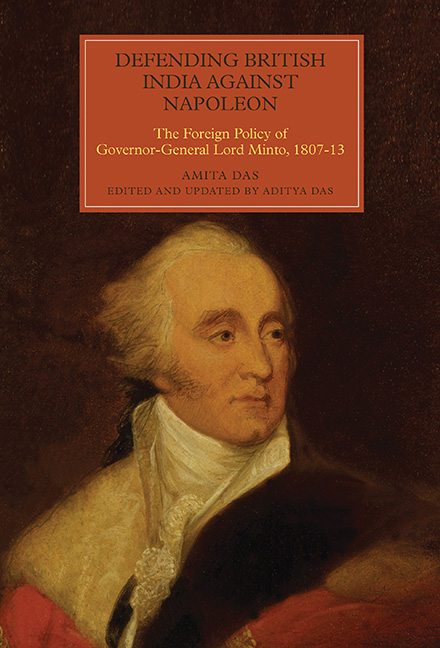Book contents
- Frontmatter
- Dedication
- Contents
- List of Illustrations
- Preface
- Abbreviations
- Chapter 1 Setting the Stage
- Chapter 2 Positioning in Persia
- Chapter 3 Creating a Buffer Zone
- Chapter 4 Protecting Trade and Supply Lines
- Chapter 5 Pre-empting French Influence in Java
- Chapter 6 Legacy of Lord Minto
- Appendix Government of the East India Company
- Bibliography
- Index
- Worlds of the East India Company
Chapter 1 - Setting the Stage
Published online by Cambridge University Press: 11 May 2021
- Frontmatter
- Dedication
- Contents
- List of Illustrations
- Preface
- Abbreviations
- Chapter 1 Setting the Stage
- Chapter 2 Positioning in Persia
- Chapter 3 Creating a Buffer Zone
- Chapter 4 Protecting Trade and Supply Lines
- Chapter 5 Pre-empting French Influence in Java
- Chapter 6 Legacy of Lord Minto
- Appendix Government of the East India Company
- Bibliography
- Index
- Worlds of the East India Company
Summary
Preamble
Founded in London in 1600 as a monopolistic joint stock venture to engage in speculative trade with India and the Far East, the East India Company struggled through its first 150 years of existence. The effects of the civil war in the 1640s and the disintegration of the Mughal Empire from the early eighteenth century onward, beginning with the death of Aurangzeb in 1707, caused major problems of stability and a reorientation from a commercial trading organisation to a military focus. The turning point was the Battle of Plassey in 1757 when hostilities with Siraj-ud-Daula, Nawab of Bengal prompted the annexation of the province by the Company. The process of expansion and resultant military expeditions caused recurrent financial strain, forcing the Company to solicit the help of the British state, which although forthcoming, resulted in greater government control over the organisation.
A major breakthrough occurred in 1765, when Robert Clive accepted on behalf of the Company, the Bengal diwani (right to collect revenues) from the emperor Shah Alam II. This modus operandi was also followed in other areas, with alliances being established on the basis of military protection in return for the rights for revenue collection. However, this resulted in a cycle of increasing expenditure as new commitments and expansions pushed up costs.
At the time of acquisition of the Bengal diwani the mood in London and Calcutta suggested that Indian revenues could alone finance further expansion of the Company's trade, particularly with regard to the purchase of tea from China. However, the Company was unable to manage its new political and military role, combined with uncontrolled private trading of its employees. Specifically, Company bills of exchange were transmitted back toward proceeds of their private adventures and this precipitated a severe financial crisis in 1771. In that year the costs of the Company's militarism, declining sales of Indian produce in London and a sudden rise in reimbursement expenses on the excessive bills issued on behalf of Company employees and dividends to shareholders all resulted in undermining the Company's liquidity.
The Company was forced to seek emergency assistance from the Government, which was forthcoming under Lord North's Regulating Act of 1773, but at a price.
- Type
- Chapter
- Information
- Defending British India against NapoleonThe Foreign Policy of Governor-General Lord Minto, 1807-13, pp. 1 - 23Publisher: Boydell & BrewerPrint publication year: 2016



